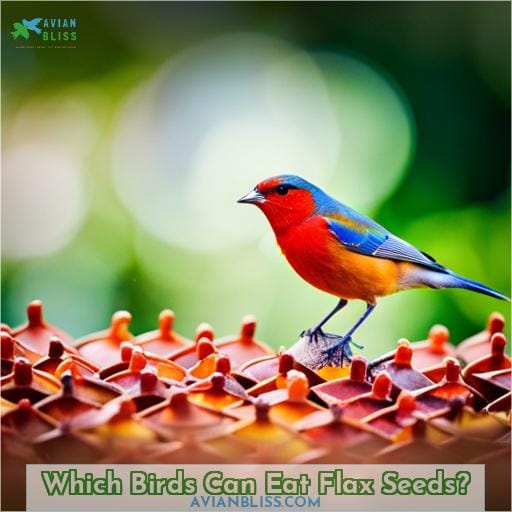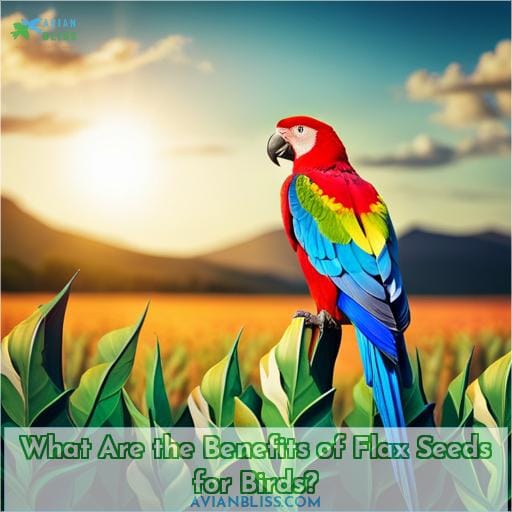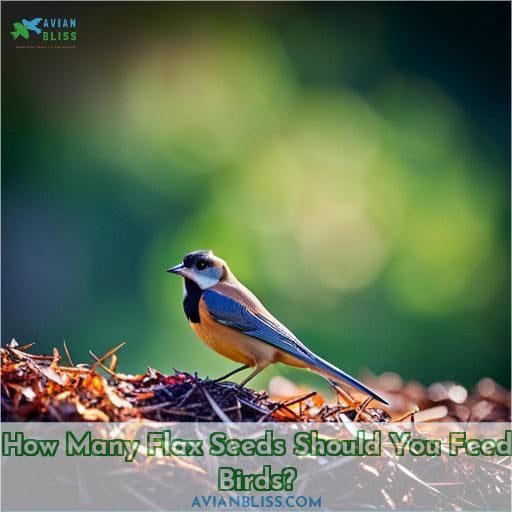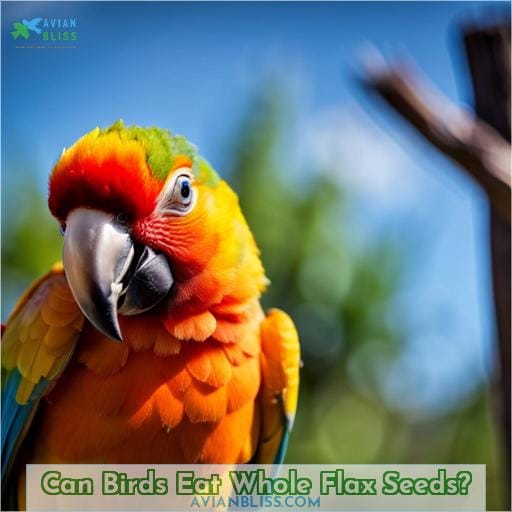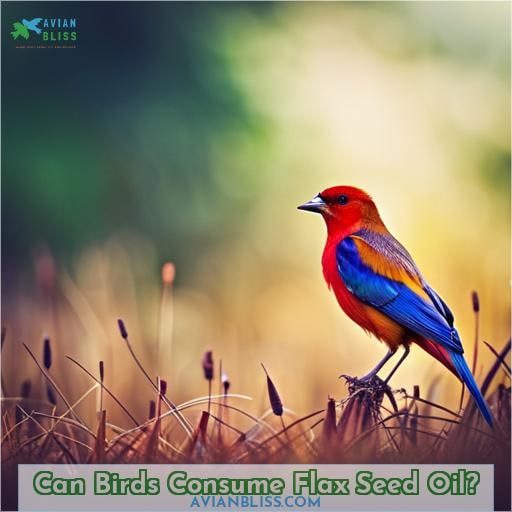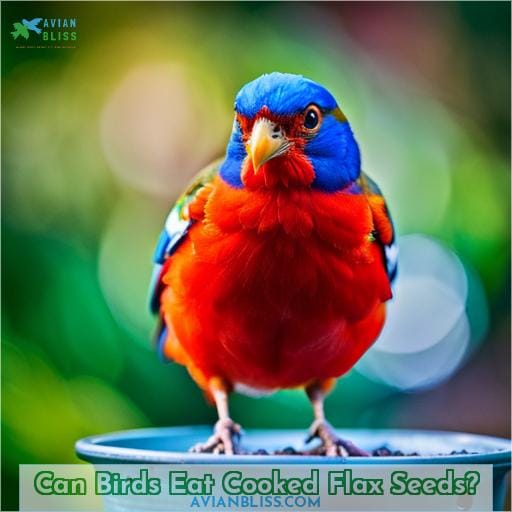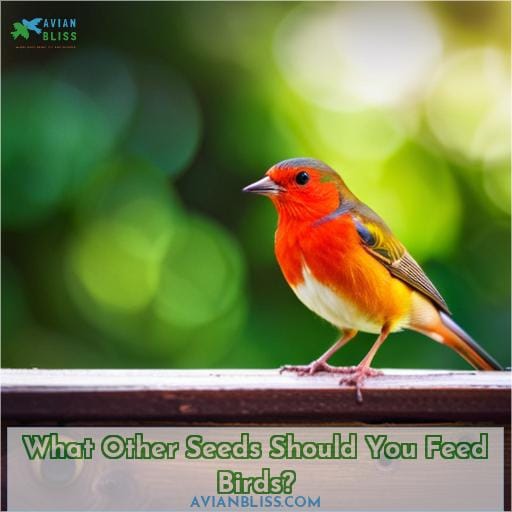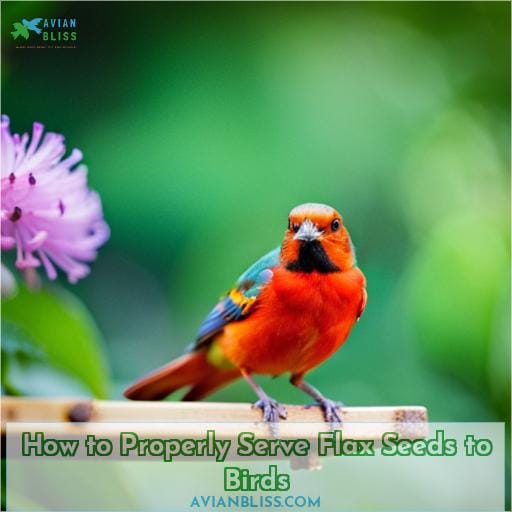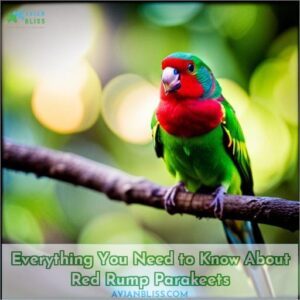This site is supported by our readers. We may earn a commission, at no cost to you, if you purchase through links.
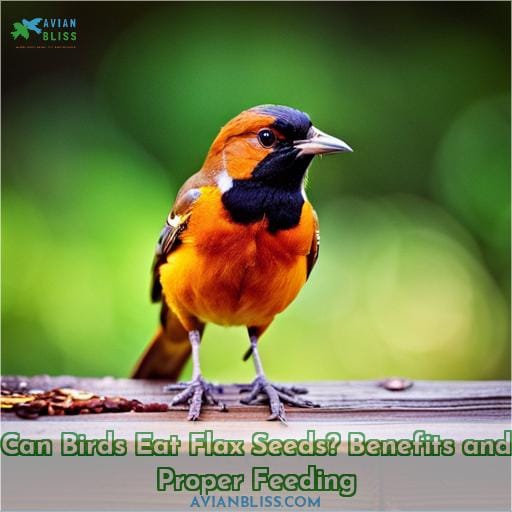 Curious about what birds can eat? Flax seeds are a popular superfood for humans, but can birds eat flax seeds too? As bird lovers and enthusiasts, it’s important to understand which foods are beneficial for our feathered friends.
Curious about what birds can eat? Flax seeds are a popular superfood for humans, but can birds eat flax seeds too? As bird lovers and enthusiasts, it’s important to understand which foods are beneficial for our feathered friends.
This article will delve into the benefits of flax seed consumption by different types of birds as well as how many you should feed them and in what form. We’ll also discuss other healthy alternatives that your pet or wild birds might enjoy.
So if you’ve been wondering whether or not to put out some flax seed snacks in your backyard this summer, read on!
Table Of Contents
- Key Takeaways
- Which Birds Can Eat Flax Seeds?
- What Are the Benefits of Flax Seeds for Birds?
- How Many Flax Seeds Should You Feed Birds?
- Can Birds Eat Whole Flax Seeds?
- Should You Give Ground Flax Seeds to Birds?
- Can Birds Consume Flax Seed Oil?
- Can Birds Eat Cooked Flax Seeds?
- What Other Seeds Should You Feed Birds?
- Where Do Flax Seeds Come From?
- How to Properly Serve Flax Seeds to Birds
- Conclusion
Key Takeaways
- Flax seeds are a nutritious option for birds, providing protein, omega-3s, and vitamin E.
- Flax seeds should be included in a diverse diet with other foods like suet, fruits, and nectar.
- Flax seeds should be fed in moderation, limiting them to 20% of the total food volume and no more than twice a week.
- Flax seeds should be mixed with other seeds like sunflower, safflower, and millet, and can be cooked and served without shells for better digestion.
Which Birds Can Eat Flax Seeds?
You’ll want to offer flax seeds to seed-loving birds like finches, doves, and robins since they contain beneficial nutrients like protein, omega-3s, and vitamin E. Seed-eating songbirds such as sparrows, cardinals, jays, and chickadees will enjoy pecking away at flax seeds too.
Make sure to provide a diversity of seeds and other foods as well like suet, fruits, and nectar.
Though flax seeds offer health advantages like fatty acids, fiber, and minerals, relying solely on them could lead to nutritional imbalance. Prepare the small, brown seeds by grinding them up or soaking them first to make digestion easier on your feathered friends.
Overall, most seed-eating birds can benefit from flax seeds in moderation as part of a varied diet. The high fat content makes them an especially helpful winter food source when birds need more energy to keep warm.
What Are the Benefits of Flax Seeds for Birds?
You’d be nuts not to add flax seeds to your bird feeder, as they offer incredible benefits like increased fiber, protein, vitamins, minerals, and those all-important omega-3s. The nutrition in flax seeds is ideal for seed-eating birds. They contain healthy fats like omega-3 fatty acids, which are great for overall bird health and feather quality.
Ground flax seeds provide more bioavailable nutrients than whole seeds, allowing birds to better absorb the fiber, protein, vitamins, and minerals. Flax seeds support birds during winter when food sources are scarce by providing energy for fat storage.
They also promote diet diversity when mixed with other seeds like sunflower, safflower, and millet.
Flax seeds give birds an array of essential nutrients that seed mixes alone cannot. Any seed-loving bird would benefit from these nutritional powerhouses. Add some to your feeder and give your feathered friends the nourishment they need.
How Many Flax Seeds Should You Feed Birds?
Tis best to control flax seed portions for your flying friends. When feeding flax seeds to birds, moderation is key.
- Limit flax seeds to no more than 20% of total food volume. Too many can cause diarrhea.
- Feed twice per week at most. Flax is high in fat, so limit frequency.
- Store properly in a cool, dark place to avoid spoilage. Rancid flax can harm birds.
Mix it up! Combine flax with other healthy seeds and grains like millet, safflower, cracked corn, and sunflower for balanced nutrition.
Vary feedings with veggies, fruits, suet too. Though flax boasts benefits, dietary variety keeps birds happy and healthy.
Can Birds Eat Whole Flax Seeds?
Can’t whole flax seeds pose a choking hazard for our feathered friends? While the benefits of flax seeds for birds are plentiful, from omega-3 fatty acids to protein, fiber, and vitamins, feeding them whole flax seeds isn’t always the best approach.
It’s ideal to give them either ground or soaked flax seeds which are easier for them to digest. The hard outer shell of whole flax seeds can be difficult for birds to break open and consume properly. By grinding them or soaking them first, you unlock more of the seed’s nutritional profile.
When incorporating flax seeds into a bird’s diet, do so in moderation as part of a diverse mix including other healthy seeds and foods based on the bird’s preferences. This ensures they get a well-rounded balance of nutrients from multiple sources, not just flax seeds alone.
Overall, it’s best to open up flax seeds to enhance their benefits for your birds rather than feeding them whole.
Should You Give Ground Flax Seeds to Birds?
Rather than offering whole flax seeds, it’s recommended to provide ground flax seeds for enhanced nutrient bioavailability.
- Remember, flax seeds are high in fat, so feed them in moderation.
- Grinding helps birds digest the oils and proteins.
- It enriches their diet with fiber, vitamins, and minerals.
- Ground flax seeds aid baby birds who can’t break open hulls.
- Mix ground flax seeds with other foods like sunflower seeds and cracked corn.
Ground flax seeds sprinkled on existing feeds or served alone give birds an omega-3 boost. Properly storing them prevents rancidity. Varying the feed with other seeds, fruits, and suet ensures a balanced diet.
Most backyard birds will relish the addition of freshly ground flax to their buffet.
Can Birds Consume Flax Seed Oil?
It would appear that the oil of flax seeds isn’t ideal for our avian friends, as the fat content is too rich and may upset their digestive tracts. Best to stick to the whole or ground seeds in moderation for their healthful omega-3’s.
While flax seed oil does provide beneficial fats, the high concentration can overload a bird’s system. It’s better to offer the seeds themselves, providing fiber, protein, and omegas in balance.
For alternatives, consider mixes with sunflower, safflower, and white proso millet seeds.
When setting up feeders, ensure proper drainage and weekly cleaning to prevent mold. Though flax seeds make a fine episodic treat, keep feed diverse, including veggies, fruits, nuts, and suet for complete nutrition.
Healthy birds start with healthy diets. Offer wholesome variety, and let flax oil be for human use alone.
Can Birds Eat Cooked Flax Seeds?
You’ll want to offer birds cooked, unseasoned flax seeds with the outer shell removed since they’re easier for them to digest. Birds enjoy the enhanced nutrient accessibility of cooked flax seeds without pesky shells.
Consider dietary preferences when serving cooked flax – seed-loving finches may relish them while insectivores like chickadees need other fare.
Cooked flax makes a nice winter supplement to energize birds, though reliance on any single food like flax seed oil is unwise. For garden birds, mix cooked flax with peanut pieces, suet nuggets, millet, and more.
Such blends attract various backyard birds by providing balanced nutrition for winter feeding.
With a diversity of cooked flax and other seeds, you’ll entice feathered friends while supporting their health.
What Other Seeds Should You Feed Birds?
The farmer scattered sunshine underfoot to brighten the place you call home. Beyond flax, diversifying the birdseed mix provides a bounty of nutrition. Rotate among seeds like millet, cracked corn, safflower, nyger, and sunflower to hit different dietary needs.
For instance, higher fat sunflower seeds fuel up birds prepping for winter. Mix in some fruit like berries, raisins, chopped apples, or oranges. Nutritious suet cakes satisfy insect eaters. Set up feeders and ground tables to suit different species.
Sparrows prefer platforms while finches favor hanging tubes. The key is variety, adjusting for the time of year and bird appetites.
A balanced buffet energizes your feathered friends.
Where Do Flax Seeds Come From?
Head for the flax fields, friend, and revel in nature’s bounty. The seeds we lovingly offer our feathered friends originate from the flax plant, Linum usitatissimum. While historically cultivated for fiber to spin into linen cloth, this multipurpose plant also provides nutrient-dense edible seeds, soothing herbal remedies, natural dyes and finishes, linseed oil for protective coatings, and stunning hues for ornamental gardens.
Though flax has been used for over 30,000 years, it remains popular today for its health-promoting omega-3 fatty acids. By providing flax seeds, we aid our avian neighbors in their seasonal preparation and overall wellbeing.
However, a balanced diet must be maintained by offering a diverse mix of seeds, fruits, suet, and more to satisfy birds’ individual dietary preferences.
With an attentive approach, our yards can become havens.
How to Properly Serve Flax Seeds to Birds
Flax seeds can provide essential nutrients for birds, but they require some care when serving. First, store any unused flax seeds in an airtight container in a cool, dry place to maintain freshness.
When ready to feed, consider placement. Position the feeder in an open area away from bushes or trees where predators may hide.
Vary offerings by mixing in other nutrient-rich seeds like sunflower or millet.
Adjust portions seasonally, increasing flax seeds in winter when energy demands rise.
Finally, keep species preferences in mind. Seed eaters like finches relish flax yet suet-loving birds need other fats.
With proper storage, strategic feeder placement, nutrient variations, seasonal adjustments, and an awareness of preferences, you can successfully incorporate flax seeds into a bird’s diet.
- Store unused flax seeds in an airtight container in a cool, dry place.
- Position the bird feeder in an open area away from potential hiding spots.
- Mix flax seeds with other nutrient-rich seeds like sunflower or millet.
- Increase flax seed portions in winter when birds need more energy.
Conclusion
In a word, yes! Birds can safely and healthily enjoy the nutritional benefits of flax seeds. Flax seeds are packed with fiber, protein, essential vitamins, minerals, and omega-3 fatty acids, making them a beneficial supplement for various seed-eating birds.
Whether whole, ground, or soaked, flax seeds should be served in moderation and as part of a diverse, balanced diet. It’s important to remember to include other seeds, fruits, and suet to provide a truly well-rounded meal for the birds.
Additionally, maintaining clean bird feeders and offering fresh water alongside the feed is crucial. By following these simple steps, you can ensure that your feathered friends are getting the nourishment they need.

